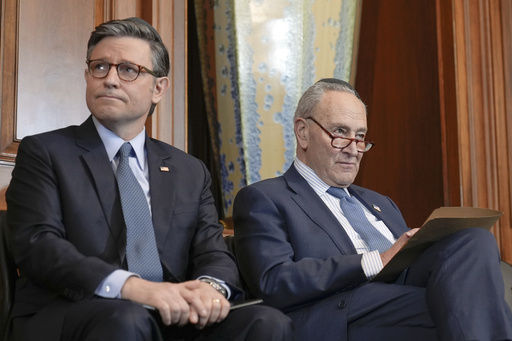
**Trump Dismisses Bipartisan Government Funding Plan Ahead of Deadline**
In a surprising move, President-elect Donald Trump has turned down a bipartisan proposal aimed at preventing a government shutdown during the Christmas season. This decision was communicated to House Speaker Mike Johnson and fellow Republicans just days before a critical deadline for federal funding. Trump’s unexpected involvement and new stipulations have thrown Congress into turmoil as lawmakers rush to finalize their work and prepare for the holidays, leaving Johnson in a difficult position to create a new plan before Friday’s expiration.
In a joint statement with Vice President-elect JD Vance, Trump emphasized the need for Republicans to be “SMART and TOUGH.” The president-elect introduced an ambitious proposal that sought to continue some government funding while also controversially including a provision to augment the national debt limit—an initiative generally met with resistance from within his own party. They stated, “Anything else is a betrayal of our country.” This hardline stance has drawn criticism from Democrats who have condemned the GOP’s decisions surrounding the emergency funding.
House Democratic Leader Hakeem Jeffries expressed his discontent, accusing House Republicans of choosing to shut down government services and inflicting damage on American families. He lamented the retreat from negotiations, asserting that “an agreement is an agreement” and warned that the consequences of this reversal would be squarely on the GOP’s shoulders.
The ambitious 1,500-page bill was already nearing collapse as hard-right conservatives voiced their opposition to increased spending, supported by billionaire Elon Musk, who swiftly criticized the proposal on his social media platform. Many lawmakers from the Republican ranks cited dissatisfaction with the proposed additions, including a long-awaited pay increase—a shock given the unproductive nature of recent congressional sessions.
Even with the inclusion of essential disaster relief funding, totaling approximately $100.4 billion to assist states recovering from devastating hurricanes and other calamities, GOP budget hawks remained unyielding. Numerous Republicans were looking to Trump for guidance on how to proceed with their votes, indicating uncertainty and division within the party.
Comments from Musk intensified the turmoil, as he asserted on social media early Wednesday that “This should not pass.” The responses flooded into Republican offices, with Rep. Andy Barr of Kentucky remarking that constituents were voicing their concerns, saying, “My phone was ringing off the hook,” in reference to Musk’s influence on voter sentiment.
The situation is particularly challenging for Johnson, who like his predecessors, finds it difficult to align the interests of a fragmented Republican majority with necessary government operations. The ongoing discord foreshadows the hardships that lie ahead for the GOP as they prepare to take full control in the upcoming year. Given this pattern, it has become clear that Trump’s endorsement will be crucial for any legislative success.
Musk, who is spearheading Trump’s newly formed Department of Government Efficiency, issued a stern warning: “Any member of the House or Senate who votes for this outrageous spending bill deserves to be voted out in 2 years!” His remarks underscore his philanthropic but worrisome influence over political trajectories, given his financial backing for Trump’s campaign.
Democratic Rep. Jamie Raskin from Maryland criticized the dynamic, suggesting it reflects a troubling scenario where a small number of affluent individuals wield significant control over political decisions, leaving the broader public feeling marginalized.
Despite Trump’s new demands complicating the planning, Democrats who participated in forming the initial proposal will likely have to step in to garner the required bipartisan support for the bill’s passage—an all-too-familiar scenario for substantial bipartisan efforts.
Trump’s insistence on addressing the debt ceiling raises significant challenges for Johnson, who has sought to maintain a rapport with the president-elect, only to see his carefully constructed plan now jeopardized. Trump reiterated his commitment to the debt ceiling issue, stating, “I will fight ’till the end.” The debt limit, set to expire in 2025, is an issue that typically necessitates extensive negotiation, often taking months to resolve.
The previous House Speaker, Kevin McCarthy, invested significant time engaging with President Joe Biden to facilitate an increase in the debt limit—a deal that, while bipartisan, was deemed insufficient by some of the conservative factions in Congress, leading to McCarthy’s ousting.
Now, as the deadline looms barely 48 hours away from a potential partial government shutdown, Trump is urging Johnson to incorporate a debt ceiling extension into the discussions. Meanwhile, the bipartisan package being dismissed would have continued government programs and services at their current levels through March 14, 2025.
The stopgap funding approach became necessary due to Congress’s failure to pass its regular appropriations bills, which are essential for financing a wide range of federal agencies. However, the lengthy bill contains several other contentious provisions.
Rep. Anna Paulina Luna of Florida went so far as to criticize the bill, labeling it a “junk sandwich.” Additionally, the proposal calls for revoking a pay-freeze provision potentially allowing for a pay adjustment of up to 3.8%, equating to an increase of approximately $6,600 in 2025. This would bring congressional remuneration to $180,600, marking the first raise since 2009.
Furthermore, critical provisions within the legislation include the full funding required to rebuild Baltimore’s Francis Scott Key Bridge, which suffered damage when struck by a cargo vessel, alongside other infrastructural plans that could usher in economic benefits for the D.C. area, such as the potential development of a new stadium for the Washington Commanders.
On healthcare, the package aims to extend Medicare telehealth coverage while addressing profits made by pharmacy benefit managers. Additionally, it contains measures aimed at counteracting China’s global ambitions, expanding on existing restrictions aimed at protecting U.S. national security. This issue resonates broadly across the political spectrum in Washington, garnering bipartisan support.
